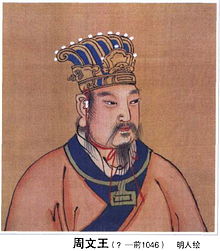This article needs additional citations for verification. (September 2017) |
| Ji Chang | |||||||||
|---|---|---|---|---|---|---|---|---|---|
| Overlord of the West | |||||||||
 | |||||||||
| Elder of the Predynastic Zhou | |||||||||
| Reign | 1100–1050 BC (50 years) | ||||||||
| Predecessor | Ji, King of Zhou | ||||||||
| Successor | King Wu of Zhou | ||||||||
| Born | 1152 BC (traditional) or 1112 BC (modern estimate) Bi (Zhou state) | ||||||||
| Died | 1050 BC (aged 62) Cheng (Zhou state) | ||||||||
| Burial | Bi (Zhou state) | ||||||||
| Spouse | Tai Si | ||||||||
| Issue | Bo Yikao King Wu of Zhou Xian, Marquis of Guan Dan Du, Marquis of Cai Feng, Count of Wey Wu, Count of Cheng Chu, Monarch of Huo Zheng, Count of Mao Zai, Monarch of Dan Zhenduo, Marquis of Cao Xiu, Marquis of Teng Gao, Count of Bi | ||||||||
| |||||||||
| Father | King Ji of Zhou | ||||||||
| Mother | Tai Ren | ||||||||
King Wen of Zhou (Chinese: 周文王; pinyin: Zhōu Wén Wáng; 1152–1050 BC, the Cultured King) was the posthumous title given to Ji Chang (Chinese: 姬昌), the patriarch of the Zhou state during the final years of Shang dynasty in ancient China. Ji Chang himself died before the end of the Zhou-Shang War, and his second son Ji Fa completed the conquest of Shang following the Battle of Muye, and posthumously honored him as the founder of the Zhou dynasty. Many of the hymns of the Classic of Poetry are praises to the legacy of King Wen. Some consider him the first epic hero of Chinese history.[1]
Although frequently confused with his fourth son Duke of Zhou, also known as "Lord Zhou", they are different historical persons.
- ^ Theobald, Ulrich (December 19, 2010). "Zhou Wenwang 周文王, King Wen of Zhou". ChinaKnowledge.de - An Encyclopaedia on Chinese History, Literature and Art. Retrieved 2021-04-27.